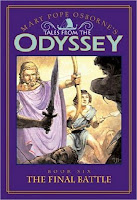For two years, I have been teaching Homer’s The Odyssey to Grade 12 Classical Civilization students. My students (those who actually read the epic poem…), are absolutely thrilled by the story. I am thrilled myself. It is a great story. I am planning on teaching it again in the Fall.
Recently, my second son, Nate (7 yrs) also discovered the excitement and thrill of the Odyssey… dangerous voyages, meddling gods and goddesses, escaping an inhospitable Cyclops, outwitting bewitching nymphs, battling self-serving and usurping nobles…
 He isn’t reading Homer (per se)… Rather, he is reading a 6-part series of chapter books retelling the famous story. The series, called Tales from The Odyssey, is written by Mary Pope Osborne (the author of the bestselling Magic Tree House series). She retains the bulk of the narrative, including the sordid moments (albeit appropriately diluted for young readers). She also uses the Greek names of gods and goddesses, heroes and monsters and she provides a pronunciation guide at the back of each book.
He isn’t reading Homer (per se)… Rather, he is reading a 6-part series of chapter books retelling the famous story. The series, called Tales from The Odyssey, is written by Mary Pope Osborne (the author of the bestselling Magic Tree House series). She retains the bulk of the narrative, including the sordid moments (albeit appropriately diluted for young readers). She also uses the Greek names of gods and goddesses, heroes and monsters and she provides a pronunciation guide at the back of each book.
My son couldn’t put them down. He devoured the books as fast and as ravenously as the six-headed Scylla or the one-eyed Polyphemus devour Odysseus’s men.
Great stories truly stand the test of time. For almost three thousand years, people have been delighted by the adventures of Odysseus and his fated voyage. Thanks to Mary Pope Osborne, the next generation is able to whet their appetite for great---and ancient---storytelling. If you know any Grade 2 students who would love to go on a romping ride of a read, look up Osborne’s Tales for the Odyssey.
NB: For big people interested in The Odyssey, I highly recommend the recent award-winning translation by Robert Fagles. For a great audio version, Ian McKellen, who played Gandalf in Peter Jackson’s recent film adaptation of Lord of the Rings, reads Fagles translation (unabridged) on CD.
Recently, my second son, Nate (7 yrs) also discovered the excitement and thrill of the Odyssey… dangerous voyages, meddling gods and goddesses, escaping an inhospitable Cyclops, outwitting bewitching nymphs, battling self-serving and usurping nobles…
 He isn’t reading Homer (per se)… Rather, he is reading a 6-part series of chapter books retelling the famous story. The series, called Tales from The Odyssey, is written by Mary Pope Osborne (the author of the bestselling Magic Tree House series). She retains the bulk of the narrative, including the sordid moments (albeit appropriately diluted for young readers). She also uses the Greek names of gods and goddesses, heroes and monsters and she provides a pronunciation guide at the back of each book.
He isn’t reading Homer (per se)… Rather, he is reading a 6-part series of chapter books retelling the famous story. The series, called Tales from The Odyssey, is written by Mary Pope Osborne (the author of the bestselling Magic Tree House series). She retains the bulk of the narrative, including the sordid moments (albeit appropriately diluted for young readers). She also uses the Greek names of gods and goddesses, heroes and monsters and she provides a pronunciation guide at the back of each book.My son couldn’t put them down. He devoured the books as fast and as ravenously as the six-headed Scylla or the one-eyed Polyphemus devour Odysseus’s men.
Great stories truly stand the test of time. For almost three thousand years, people have been delighted by the adventures of Odysseus and his fated voyage. Thanks to Mary Pope Osborne, the next generation is able to whet their appetite for great---and ancient---storytelling. If you know any Grade 2 students who would love to go on a romping ride of a read, look up Osborne’s Tales for the Odyssey.
NB: For big people interested in The Odyssey, I highly recommend the recent award-winning translation by Robert Fagles. For a great audio version, Ian McKellen, who played Gandalf in Peter Jackson’s recent film adaptation of Lord of the Rings, reads Fagles translation (unabridged) on CD.







